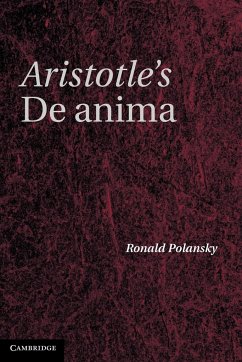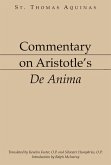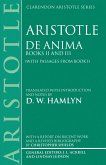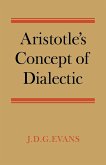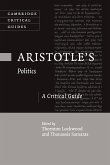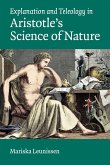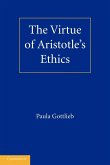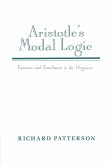Ronald Polansky
Aristotle's de Anima
Ronald Polansky
Aristotle's de Anima
- Broschiertes Buch
- Merkliste
- Auf die Merkliste
- Bewerten Bewerten
- Teilen
- Produkt teilen
- Produkterinnerung
- Produkterinnerung
Aristotle's De Anima was the first systematic philosophical account of the soul and its faculties.
Andere Kunden interessierten sich auch für
![Commentary on Aristotle's de Anima Commentary on Aristotle's de Anima]() Thomas AquinasCommentary on Aristotle's de Anima38,99 €
Thomas AquinasCommentary on Aristotle's de Anima38,99 €![de Anima de Anima]() Aristotlede Anima58,99 €
Aristotlede Anima58,99 €![Aristotle's Concept of Dialectic Aristotle's Concept of Dialectic]() J. D. G. EvansAristotle's Concept of Dialectic45,99 €
J. D. G. EvansAristotle's Concept of Dialectic45,99 €![Aristotle's Politics Aristotle's Politics]() Aristotle's Politics30,99 €
Aristotle's Politics30,99 €![Explanation and Teleology in Aristotle's Science of Nature Explanation and Teleology in Aristotle's Science of Nature]() Mariska LeunissenExplanation and Teleology in Aristotle's Science of Nature36,99 €
Mariska LeunissenExplanation and Teleology in Aristotle's Science of Nature36,99 €![The Virtue of Aristotle's Ethics The Virtue of Aristotle's Ethics]() Paula GottliebThe Virtue of Aristotle's Ethics46,99 €
Paula GottliebThe Virtue of Aristotle's Ethics46,99 €![Aristotle's Modal Logic Aristotle's Modal Logic]() Richard PattersonAristotle's Modal Logic59,99 €
Richard PattersonAristotle's Modal Logic59,99 €-
-
-
Aristotle's De Anima was the first systematic philosophical account of the soul and its faculties.
Produktdetails
- Produktdetails
- Verlag: Cambridge University Press
- Seitenzahl: 598
- Erscheinungstermin: 1. Juni 2010
- Englisch
- Abmessung: 229mm x 152mm x 35mm
- Gewicht: 958g
- ISBN-13: 9780521148856
- ISBN-10: 0521148855
- Artikelnr.: 29984715
- Herstellerkennzeichnung
- Libri GmbH
- Europaallee 1
- 36244 Bad Hersfeld
- gpsr@libri.de
- Verlag: Cambridge University Press
- Seitenzahl: 598
- Erscheinungstermin: 1. Juni 2010
- Englisch
- Abmessung: 229mm x 152mm x 35mm
- Gewicht: 958g
- ISBN-13: 9780521148856
- ISBN-10: 0521148855
- Artikelnr.: 29984715
- Herstellerkennzeichnung
- Libri GmbH
- Europaallee 1
- 36244 Bad Hersfeld
- gpsr@libri.de
Ronald Polansky is Professor of Philosophy at Duquesne University. Editor of the journal Ancient Philosophy since founding it in 1979, he is the author of Philosophy and Knowledge: A Commentary on Plato's Theaetetus, and co-editor of Bioethics: Ancient Themes in Contemporary Issues.
Introduction
1. The De Anima and self-knowledge
2. Study of soul in relation to physics
3. The cognitive faculties and physics
4. Aristotle's procedures and the quest for thoroughness
5. Background assumptions for study of the soul
6. The truth and interest of the De Anima
7. The text of the De Anima
Book 1: 1. The nobility and difficulty of study of soul. Its connection with body
2. The predecessors' use of soul to account for motion and perception
3. Criticism of predecessors' way of accounting for motion
4. Criticism of the harmonia view as an account of motion
5. Criticism of predecessors' way of accounting for cognition
Book 2: 1. Definition of soul
2. What is life?
3. How powers of soul are distributed and united in the soul
4. The nutritive faculty, its object and subfaculties
5. Clarification of being affected, living as saving, and the first definition of sense
6. The three sorts of sensible objects
7. Vision, its medium, and object
8. Hearing, sound, and voice
9. Smell and odor
10. Taste is a contact sense. The tasteable
11. Touch, the tangibles, and sense as a mean
12. Definition of sense and whether sensibles affect non-perceiving bodies
Book 3: 1. In the world as it is there can be but the five senses
2. What allows for perceiving that we perceive? Sense comes together in a common power so that the five senses are subfaculties of a central sense faculty
3. Distinguishing sense and thought. What is phantasia?
4. What is mind as that capable of thinking all things
5. What enables thinking to occur
6. The sorts of intelligible objects
7. Phantasia has a role in all thinking
8. The mind can think all things
9. There is a capacity for progressive motion
10. The desiderative capacity is the primary cause of progressive motion
11. Even the simplest animals have indefinite phantasia and calculative phantasia fits the account of progressive motion
12. The necessary order of the faculties of the soul
13. The sort of body requisite to support the order of the faculties of soul
Bibliography.
1. The De Anima and self-knowledge
2. Study of soul in relation to physics
3. The cognitive faculties and physics
4. Aristotle's procedures and the quest for thoroughness
5. Background assumptions for study of the soul
6. The truth and interest of the De Anima
7. The text of the De Anima
Book 1: 1. The nobility and difficulty of study of soul. Its connection with body
2. The predecessors' use of soul to account for motion and perception
3. Criticism of predecessors' way of accounting for motion
4. Criticism of the harmonia view as an account of motion
5. Criticism of predecessors' way of accounting for cognition
Book 2: 1. Definition of soul
2. What is life?
3. How powers of soul are distributed and united in the soul
4. The nutritive faculty, its object and subfaculties
5. Clarification of being affected, living as saving, and the first definition of sense
6. The three sorts of sensible objects
7. Vision, its medium, and object
8. Hearing, sound, and voice
9. Smell and odor
10. Taste is a contact sense. The tasteable
11. Touch, the tangibles, and sense as a mean
12. Definition of sense and whether sensibles affect non-perceiving bodies
Book 3: 1. In the world as it is there can be but the five senses
2. What allows for perceiving that we perceive? Sense comes together in a common power so that the five senses are subfaculties of a central sense faculty
3. Distinguishing sense and thought. What is phantasia?
4. What is mind as that capable of thinking all things
5. What enables thinking to occur
6. The sorts of intelligible objects
7. Phantasia has a role in all thinking
8. The mind can think all things
9. There is a capacity for progressive motion
10. The desiderative capacity is the primary cause of progressive motion
11. Even the simplest animals have indefinite phantasia and calculative phantasia fits the account of progressive motion
12. The necessary order of the faculties of the soul
13. The sort of body requisite to support the order of the faculties of soul
Bibliography.
Introduction
1. The De Anima and self-knowledge
2. Study of soul in relation to physics
3. The cognitive faculties and physics
4. Aristotle's procedures and the quest for thoroughness
5. Background assumptions for study of the soul
6. The truth and interest of the De Anima
7. The text of the De Anima
Book 1: 1. The nobility and difficulty of study of soul. Its connection with body
2. The predecessors' use of soul to account for motion and perception
3. Criticism of predecessors' way of accounting for motion
4. Criticism of the harmonia view as an account of motion
5. Criticism of predecessors' way of accounting for cognition
Book 2: 1. Definition of soul
2. What is life?
3. How powers of soul are distributed and united in the soul
4. The nutritive faculty, its object and subfaculties
5. Clarification of being affected, living as saving, and the first definition of sense
6. The three sorts of sensible objects
7. Vision, its medium, and object
8. Hearing, sound, and voice
9. Smell and odor
10. Taste is a contact sense. The tasteable
11. Touch, the tangibles, and sense as a mean
12. Definition of sense and whether sensibles affect non-perceiving bodies
Book 3: 1. In the world as it is there can be but the five senses
2. What allows for perceiving that we perceive? Sense comes together in a common power so that the five senses are subfaculties of a central sense faculty
3. Distinguishing sense and thought. What is phantasia?
4. What is mind as that capable of thinking all things
5. What enables thinking to occur
6. The sorts of intelligible objects
7. Phantasia has a role in all thinking
8. The mind can think all things
9. There is a capacity for progressive motion
10. The desiderative capacity is the primary cause of progressive motion
11. Even the simplest animals have indefinite phantasia and calculative phantasia fits the account of progressive motion
12. The necessary order of the faculties of the soul
13. The sort of body requisite to support the order of the faculties of soul
Bibliography.
1. The De Anima and self-knowledge
2. Study of soul in relation to physics
3. The cognitive faculties and physics
4. Aristotle's procedures and the quest for thoroughness
5. Background assumptions for study of the soul
6. The truth and interest of the De Anima
7. The text of the De Anima
Book 1: 1. The nobility and difficulty of study of soul. Its connection with body
2. The predecessors' use of soul to account for motion and perception
3. Criticism of predecessors' way of accounting for motion
4. Criticism of the harmonia view as an account of motion
5. Criticism of predecessors' way of accounting for cognition
Book 2: 1. Definition of soul
2. What is life?
3. How powers of soul are distributed and united in the soul
4. The nutritive faculty, its object and subfaculties
5. Clarification of being affected, living as saving, and the first definition of sense
6. The three sorts of sensible objects
7. Vision, its medium, and object
8. Hearing, sound, and voice
9. Smell and odor
10. Taste is a contact sense. The tasteable
11. Touch, the tangibles, and sense as a mean
12. Definition of sense and whether sensibles affect non-perceiving bodies
Book 3: 1. In the world as it is there can be but the five senses
2. What allows for perceiving that we perceive? Sense comes together in a common power so that the five senses are subfaculties of a central sense faculty
3. Distinguishing sense and thought. What is phantasia?
4. What is mind as that capable of thinking all things
5. What enables thinking to occur
6. The sorts of intelligible objects
7. Phantasia has a role in all thinking
8. The mind can think all things
9. There is a capacity for progressive motion
10. The desiderative capacity is the primary cause of progressive motion
11. Even the simplest animals have indefinite phantasia and calculative phantasia fits the account of progressive motion
12. The necessary order of the faculties of the soul
13. The sort of body requisite to support the order of the faculties of soul
Bibliography.

